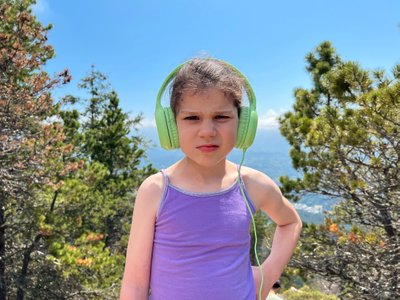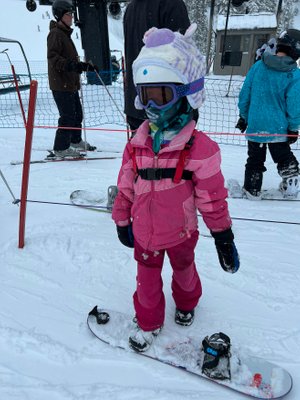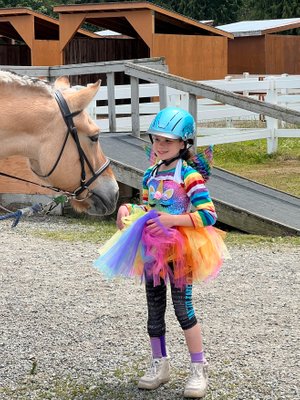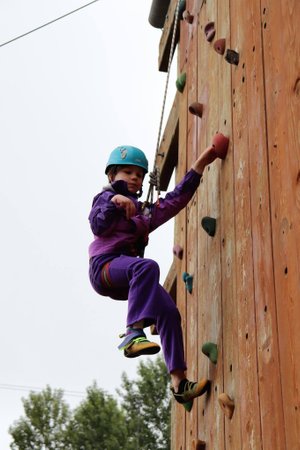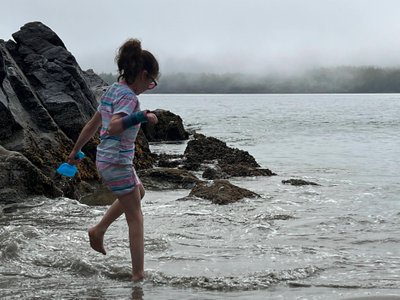Journal entry by Lisa G —
Gosh, apologies that this post is so delayed. It really seems like just yesterday that we were celebrating Christina's fourth hemiversary. This summer has flown by.
Medical
As usual, the shortest update. Seizure free. Med free. No shunt issues. The changes we made around stretching, splinting, and Baclofen late last year have helped quite a bit with range of motion in her right (affected) arm and hand. She had another check-in with her rehab medicine provider in March, and she was pleased with her progress.
Therapies and Extracurriculars
Huge changes over the past few months.
Early in the year, Christina's longtime orthotist (the person who casts and fits her AFO/leg brace) moved on to a different role. Thankfully, the PT half of her orthotics team is still around and partnered with a new orthotist, who is just as wonderful.
In March, Christina was discharged from vision therapy 🥳🥳🥳 after about a year of weekly sessions. Her sessions mostly focused on eye tracking (being able to move her eyes smoothly to focus on something new) and eye teaming (being able to point both eyes accurately at the same location). Even for me as a layperson, it was obvious just how much better her eyes were working together at her last evaluation, as compared to her first. She had a follow-up evaluation in July, and the gains she had made were sticking, which was really awesome to see.
Not so awesome: She lost both her speech therapist and her OT, as both of them moved on to new roles 💔 Both had been working with Christina since the very beginning, had tackled some of the most challenging areas of her recovery, and had helped her make incredible progress. As much as we miss working with them directly, we still see their impact every day in all that Christina can do now.
The one upshot of losing two long-time therapists is that it was a good opportunity to step back and think through Christina's current therapy needs. For speech, we found a new SLP who has significant expertise around reading, which is where Christina's biggest language-related needs are right now.
For OT, we decided not to seek out a replacement. This is the culmination of an important mindset shift we've been undergoing over the past year or so, as Christina has gotten increasingly involved in community-based activities. This winter, she successfully completed a snowboarding lesson series with non-disabled peers at Mount Baker 💪 as well as continuing dance classes, swimming lessons, and rock climbing. At this point in her recovery/growth, those activities are just as useful as formal therapies. She'll still have OT eyes on her regularly at Little Bit (hippotherapy) as well as school, and that's enough right now.
PT is going according to the "episodic" plan that I described in my last update: She took a break from November to July, is doing a short burst of weekly PT over the summer, and then will take another break as the school year starts up again.
Taking these changes all together: Christina is going from 6 sessions of various therapies last fall, down to just 2 this fall (Little Bit and the reading-focused SLP) 😮
School
Christina finished 2nd grade strong. Her report card put her at or above standard for every subject, with the exception of foundational reading skills (which are broken out separately from general reading skills).
At the end of May, she had another neuropsych evaluation with Dr. Patrick, which confirmed her continued progress. In math, for example, she made over a year's worth of progress in the ~9 months between the two neuropsych evaluations. Another result that made me smile was that she tested firmly in the average range for naming items in a given category, e.g. "name as many animals as you can." I remember watching her school SLP do that test with her in the fall of her kindergarten year, and she just could not do it, due to her aphasia (speech deficit). And now she can. It's proof positive that she's continuing to make gains in speech, even years out from surgery.
Reading, too, continues to improve, slowly but steadily. In that area, Christina progressed about 6 months in the ~9 months between the two evaluations. Dr. Patrick said (and we agreed) that that rate of progress is excellent, given all the challenges that she's facing. She tested at around pre-K to K level for phonological processing and decoding, 1st grade level for word reading and comprehension -- with the latter scores clearly hindered by the phonological processing deficits. This summer, she did 4 weeks of ESY, focused on reading, and I'm hopeful that it'll prevent some of the "summer slide" so she can pick right back up when school starts again.
One of Dr. Patrick's most surprising findings was on the RAN (rapid automatized naming) testing. Basically showing her a sheet with a bunch of random letters on it, and testing how quickly she can name them. In previous rounds of testing, her RAN scores have been below the 1st percentile -- unsurprising for someone with aphasia. Many dyslexic individuals also have low RAN scores, and research has shown that RAN scores do not improve, even with direct intervention. As a result, even "remediated" dyslexics are often accurate but slow readers. I figured that was where Christina was headed (which is totally fine). But, in this round of testing, her RAN scores were all the way up in the average range! 😮 I suspect this massive improvement is a result of all that focus (no pun intended) on eye tracking in vision therapy. Whatever the reason, those results instantly blasted through any sort of suspected limits around what she's ultimately capable of when it comes to reading.
In addition to her academic growth, Christina also made huge strides around self-advocacy. One big milestone: She participated in her IEP annual review for the first time. At this age, I asked her some basic questions about school, wrote down her responses, and asked her case manager to include them in her written IEP. Then, at the IEP meeting, she joined for the first few minutes and I asked her the same questions and she responded. Then she went off to play, because she is 8 😂
While it may not sound like much, her input was incredibly valuable. One thing she brought up was that she doesn't like missing out on activities with her classmates for disability-related stuff. Schedules are hard and sometimes conflicts are unavoidable, but her feedback had a profound impact on all of us. In particular, one of the conflicts was that she had to leave early on Fridays for OT, and therefore missed out on the class's "Fun Friday" activities. Upon hearing Christina express how much she wanted to do Fun Fridays, her general education teacher immediately promised to do at least one Fun Friday earlier in the day. She followed through, and Christina was so happy.
Another example: Her new reading/speech therapist initially offered a time slot that would have required her to leave school a little early on Thursdays. Previously, I would have snapped it up anyway -- that particular therapy is SO important! But with Christina's own feedback fresh on my mind, I realized hey, it's already May, why not just wait till summer, to avoid more school conflicts? So that's what we did, and now she's slotted in at a time that won't conflict with school once it starts up again 👍
One last piece of good news: The school district ended up redrawing school boundaries in a way that assigns our home to a new elementary school this fall, but we were approved for a variance that allows Christina to stay at her current school through 5th grade ❤️ After all the progress we've made with her current team over the last three years, it was a huge relief to find out that we won't have to start all over with a new team.
On to year 5...
Every year is a big year for Christina, but this one coming up feels like a really big year. From stepping up to the increased academic demands of 3rd grade, to navigating the emotions around that big anniversary that's looming next June. I know she's ready... me, on the other hand? Just doing my best to keep up 😁
-
May 2023: At the top of Little Si, a classic Christina face (she ...February 2023: Huge progress out on the slopes of Mount Baker ...Patients and caregivers love hearing from you; add a comment to show your support.Help Christina Stay Connected to Family and Friends
A $25 donation to CaringBridge powers a site like Christina's for two weeks. Will you make a gift to help ensure that this site stays online for them and for you?
Show Your Support
See the Ways to Help page to get even more involved.


